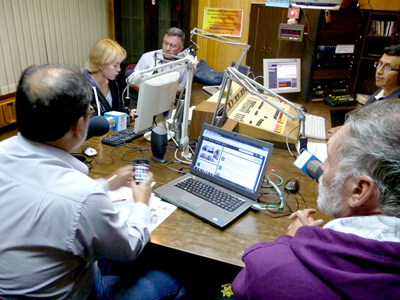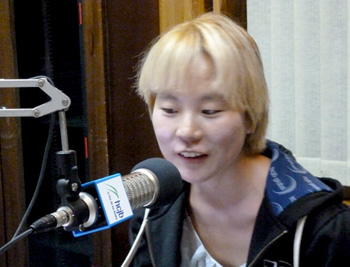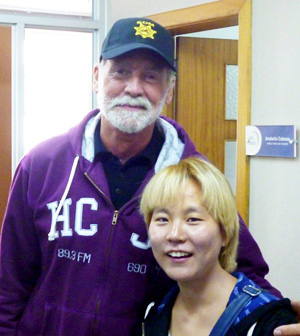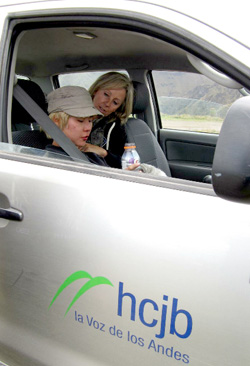MENU
 |
| Edwin Chamorro and the team at Radio Station HCJB in Quito does a live interview with rescued South Korean tourist Jieun Rho. |
"I am near the tower," she tells an English-speaking friend via cell phone in her second effort to be rescued from atop Pichincha, a 14,500-foot peak above Quito. Earlier communication attempts between the South Korean tourist and an emergency services dispatcher at Ecu911 had failed. Rho speaks Korean and English, but not Spanish.
Scratched by underbrush during a fall while exploring, she thought using a landmark like a tower would help. But the search team could not zero in on her, saying the word "tower" was like mentioning a tree in a forest with several dozen telecommunications towers dotting an area of Mount Pichincha known as Las Antenas.
"I kept saying, 'The tower; the tower,'" Rho told journalist Edwin Chamorro in an interview afterwards on Radio Station HCJB. What she did not realize was that many towers dot the area. "So they were talking about the other side [of the mountain], and I just knew 'the tower' because I couldn't see anything else."
T
 |
| Jieun Rho recounts her ordeal on Mount Pichincha. |
She had traveled on a cable car to a tourist spot, El Teleférico, which departs from an amusement park. After leaving the gondola at the site's terminus on the flank of Rucu Pichincha, she began exploring a hiking path. Then suffering a fall, she became disoriented and thus began for her, a harrowing experience. The ensuing days saw her wandering the area above the city.
Pichincha has its "rules," said Carlos Quillupangui, a fireman who patrols the El Teleférico area for wildfires and other emergencies. Those who do not know the trails-the majority of visitors are tourists-should use guides, he told the newspaper, El Comercio. Most certainly, getting back to El Teleférico before a fog rolls in is critical, Quillupangui added in an article titled, "Getting Lost on Rucu Pichincha Is Easy."
"Cell phones have GPS, and that is a big help in finding someone promptly, he said, although the article did not specifically reference Rho's phone. "A higher priority even than food is having drinking water to stay hydrated."
 |
| Patrick Wehrly with Jieun Rho. |
"Were there times you thought you might die?" asked Chamorro. "I thought about it 10 times … or 10,000 times," she replied. "I couldn't see anyone for four days. It was very deep inside [the mountain canyons], and I thought maybe I would die without saying anything and not be found."
"Even though I thought lots of times that I might die, I also thought I can't die because of my loved ones," said Rho afterwards.
By Thursday, June 27, praying had become a part of her increasingly desperate situation. "I prayed about why it happened because I thought everything would have [a] meaning," she recounted to Chamorro. "I thought [of how] I lived a very selfish life, so I just want to share my life."
In those critical moments prior to her rescue, Rho decided that she wanted to share love with others and to help people in need. "After that I saw some people at the antennas, but it was on a different mountain," she described.
At about 1 p.m. Thursday workers with Ecuatronix contacted Ecu911, saying that Rho had been found. Reviewing the moments of her dramatic rescue afterwards, Rho remembered that "it was not close, but I saw some people moving so I shouted. And I felt like they stopped and they were looking at me."
"So I was just kept shouting, and I was just going down and I couldn't believe that I met some people because I couldn't see anyone for four days. And I felt like, OK, maybe it's because of my prayer," she said.
Among the first humans she'd seen in days were staff members from Radio Station HCJB: Mauricio Patiño, Tatiana de la Torre, Milton Pumisacho, Duval Rueda and Jim Childs along with their guests, Patrick and Andrea Wehrly.
 |
| Jieun Rho is refreshed by a beverage and the warmth of a pickup from Radio Station HCJB. |
"We had just prayed for the lost," said Patrick Wehrly, who accompanied Rho in the studio for the interview with Chamorro. "So Jieun was praying that she would be found, and we were praying for the lost. We were thinking spiritually lost, but physically lost is good." People in the studio were smiling or even chuckling at Patrick's analysis of God bringing people along at the right time.
"I believe that this is the work that HCJB has been doing for years," he summarized. "The ministry has been rescuing people for years-rescuing them from drugs, from alcohol, from marriage problems."
Describing her own viewpoint, Rho related, "I always felt that there was something or someone I could believe in, but it was not specifically a figure."
Further questioned on whether her days and nights alone on Pichincha elicited within her a belief in God's existence, she said, "Yeah, I think that is why I prayed."
Sources: HCJB Global, El Comercio
